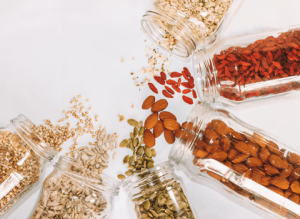Help and Support Our Planet
Being ‘eco’ can benefit you in so many ways, whether it’s to help save our planet, pocket a few more pennies at the end of the month or just to find out how easy it is to make small changes to your lifestyle. Honestly, check out these tips, you’ll wonder why you hadn’t done it sooner!
In your Bake House
Here are some tips to bake sustainably
Silicone Baking Mats
One of the ways you can reduce the waste you produce in the kitchen is by buying some silicone baking mats. These can be used to line baking tins just as you would with greaseproof paper, and can then be washed and used again! Silicone baking mats are available in different shapes and sizes, and are made to last.
You can also buy reusable muffin cases which can be washed after use. This saves on all the paper bun cases that barely make it out of the oven before the muffin is eaten! (As well as reducing the plastic waste from the packaging!)
At the end of its life, silicone is recyclable in some facilities, so check your local waste facility.
Baking Paper
If you would prefer to use baking paper, remember that not all baking paper is compostable or recyclable, because of the silicone or paraffin coating on the paper to make it non-stick. Things to look out for are recycled, biodegradable, FSC certified (responsibly-sourced paper) and non-bleached.
Another option is to go without! Some recipes will work fine without greaseproof paper if you grease the tin well with butter, margarine or another substitute. This brings me to my next point!
Save those butter wrappers!
If you use blocks of butter or margarine, keep the wrappers in the fridge, then use them to grease the tins before baking. There’s usually enough butter left on the wrapper. My granny always had a stash of old margarine wrappers in the fridge, used until breaking point! She would even sometimes use the wrapper itself to line the tin (butter side up)! This is just one example of getting the most out of non-recyclable packaging.

Try to buy packaging-free ingredients
A few months ago, a found a shop nearby called Cult Zero that sells packaging-free foods, like nuts, chocolate chips, oats, teas, pasta… the list goes on! It’s so wonderful to be able to buy products that usually come in plastic in other shops. All you need is a container (or they have paper bags available in my local shop if you forget!), and they will fill it for you! Washed and reused take-away containers are great for this. Biscuit and sweet tins are also great for getting foods in larger amounts, although it’s heart-breaking to open a biscuit tin only to find porridge oats! Shops like this are becoming more common around Ireland, try searching terms like “Zero waste shopping” or “plastic free shopping” to find a zero-waste shop in your area.
In your local grocery store, try bringing your own produce bags instead of using the plastic bags made available. You can buy net bags especially for this purpose, or try upcycling an old t-shirt at home to make a handy tote bag for your fruit and veg!

Freezing baked goods
Many baked goods freeze well, baked or unbaked, so check the recipe to see if you can freeze what you’re making. I often have a stash of unbaked cookies in the freezer ready to go! This helps reduce waste if you’re afraid some of the food will go stale before you eat it all. Avoid turning on the oven for just a couple cookies though, that is a waste of electricity!
Buy Local, Organic and Fairtrade ingredients
It’s important to buy sustainably produced ingredients. A great way to do this is by buying locally-produced ingredients, which can be a simple as “buying Irish” from the grocery store. If it is within your budget, organic foods don’t contain synthetic fertilisers and pesticides, and are better for you and the environment. Fairtrade ingredients are responsibly sourced, taking into consideration the livelihoods of farmers and their communities. Ingredients like chocolate, bananas and sugar can be purchased Fairtrade. This reduces your impact on the environment and on the people who produce the ingredients in your baking.
Reuse materials
Materials such as aluminium foil and foil trays can often be reused. Simply wash it, make sure it is clean and fully dry before storing it, and use it again! Clean aluminium foil is recyclable, so when you’re finished with it, make sure to wash, dry and recycle it.
Reusable piping bags
If you like to pipe icing on cakes, cupcakes or cookies, try using reusable, washable piping bags, rather than disposable ones which are often made of soft, non-recyclable plastic. These are available in different sizes and styles!

Use up leftovers
If you have leftovers (that’s a big “IF”!), make them into something new! Use leftover sponge cake in a trifle or make it into cake pops, crumble cookies onto ice-cream or make a cheesecake base, make stale bread into French toast or bread and butter pudding! The options are endless! See what you can create with your leftovers.
Plan ahead!
Try to decide what you would like to bake before your next grocery shop, so you can buy what you need. Only buy the amount you need if it’s not something you bake with regularly! This will help reduce waste, especially of perishable goods (e.g., butter and cream).
If you try just one of these tips, you’ve made a great start at becoming a more sustainable baker! Nobody is perfect, so try what works for you, and let us know how you get on!
Happy Baking!
In the House
We’re pretty much in our houses 24/7 at the moment and that gives us the opportunity (and really no excuse!) to start making some positive changes to the way we consume energy and dispose of packaging.
If you’re not using it – switch it off
It’s easy to forget, we’re all guilty of it, but how hard is it really to unplug something when you’re done with it? Leaving your electrical equipment on standby uses up needless energy. By unplugging, you’ll notice a huge difference in your energy bill at the end of the month.
Eat less meat
Not many people realise, but consuming meat has a massive impact on the environment. Eating meat contributes to the levels of carbon and other pollutants affecting our landscapes and waterways. The agricultural business creates as much greenhouse gas emissions as the entire world’s cars, trucks and planes due to the sheer volume of deforestation required to make way for livestock and the methane gas produced by the animals themselves.
Compost
We’re all guilty of it, we buy salad, fruit and vegetables with the best intentions of eating it before the use by date and end up forgetting they’re packed neatly away in our fridge drawers – oops! The tomatoes have gone a bit squishy, the cucumber certainly isn’t fit for consumption and that banana has gone well and truly brown. The solution – compost.
Not only are you contributing less to the landfill, you’ll be creating a brilliant natural fertiliser to keep your garden looking greener.
Ditch the plastic
There isn’t any escaping it, plastic is absolutely everywhere. It’s estimated that by 2050 there will be more plastic in the ocean than fish (this makes us super sad!). It’s within our power to stop using plastic by making small changes to the way we live. For example, rather than buying a plastic bag every time you do a supermarket shop, you can reuse the bags you have at home. Avoid using the plastic bags to collect your fruit and veg, instead buy reusable net bags to hold your bananas until you get home. To find out how to make bigger changes to the way you use plastic.
Recycle, Reuse, Reduce
You probably didn’t know you could recycle or reuse certain things you buy. Don’t worry, we’ve put together a handy list of how to recycle certain packaging or how to give it another life after it’s been used.
Carpet – Don’t just throw them away, there are carpet reclamation services that will collect and recycle your old carpet.
Batteries – Often supermarkets or the odd convenience shop will have designated buckets to recycle your old batteries, check before you recycle though, not all are applicable!
Wine Corks – Yes, there is the option to use them as something decorative or creative at home, but there is also a recycling scheme for them too. The corks you’re not willing to decorate your home with can be repurposed for something new in the form of sustainable furniture.
Cardboard Boxes – These fall into the same category as paper but can also be recycled in much more creative ways. You can either shred the cardboard for packaging your products, or if you fancy yourself as a bit of a gardener, you can use sheets of cardboard in your compost.
That piece of technology attached to your hand (your phone!) – These tech pieces that we all seem to rely on these days can be reused when you’re done with them or even taken apart for mechanical shredding to reuse the metals.
At the Office
Does your workplace have a recycling program in place? Some of the simplest changes can make a huge difference for our planet. Here are some tips:
Collect More
Recycling is more than just paper, cans and bottles these days, as we’ve already mentioned above! Computers and laptops are items which are available for recycling, there are dedicated companies will reclaim and repurpose meaning less waste goes to landfill.
Here are some possible materials which may just be thrown into waste by your company:
Light bulbs
Batteries
Cardboard
Printer Ink Cartridges
Newspaper
Cans and Bottles
Recycling Bins
Why not introduce some specific recycling bins to reduce the excuse for not recycling? If you take away the individual bins for your employees, they can use a centralised recycling and waste unit which will mean all of your business waste is nicely separated. When employees are sorting their own waste they become more aware of what they are throwing away rather than having the convenience of a waste bin under their desk.
Promote litter-free lunches
Encourage your employees to bring in their own reusable lunch bags to reduce the use of carrier bags which are used once and then thrown into waste.
Go paperless
As technology progresses at a rapid rate, we are blessed with more apps and systems which reduce our need for printing on paper and thanks to email, the fax machine is slowly becoming redundant.
It may not be completely realistic for your office to go 100% paperless, but it’s a step in the right direction to reduce the amount of documents you print on paper. For example, memos and company announcements can be sent via email or another communication system.